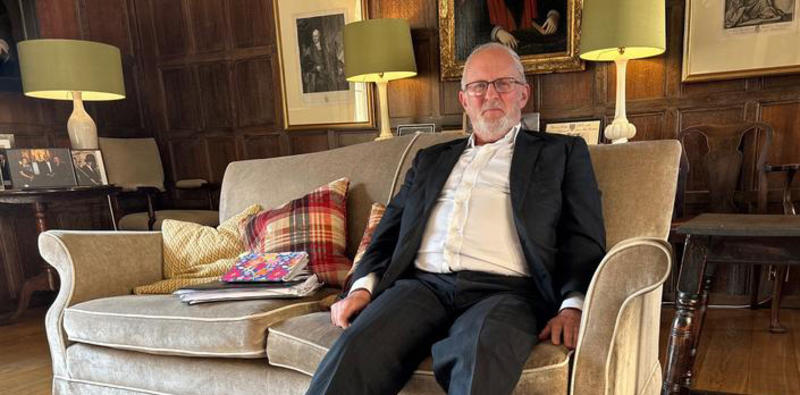WORSE THAN YOU MIGHT THINK

WORSE THAN YOU MIGHT THINK
Recent governments have presided over a collapse in public standards, contends the Principal of Brasenose College
Published: 9 May 2024
Author: Richard Lofthouse
Share this article
We are towards the end of a delightfully expansive discussion, one to one like a tutorial, in the beautiful Principal's Lodgings of Brasenose occupied currently by John Bowers KC.
The subject in front of us now for over an hour is the one meticulously sifted by John in Downward Spiral: Collapsing Public Standards and How to Restore Them, just published in April.
I articulate a view that I believe most readers would come to on their own if they read this intensely engaging book: 'I had no idea that it was so bad.'
In that sense revelatory, the book has an Appendix listing controversial public appointment cases, most of them under Boris Johnson's (Balliol, 1983) short Premiership (2019-22).
It starts with Nimco Ali, the 'social activist' friend of Carrie Johnson directly appointed with no scrutiny to an ill-defined role tackling violence against women and girls. It ends with the nakedly political replacement of Sir Vernon Ellis, who presided over honours appointments, by a Tory donor.
Some of this stuff only came to the surface during conversations conducted by John while researching the book, and his list of acknowledgements is extraordinarily expansive.
In this sense the book is an early draft of history for very recent events, the exact texture and detail of which was not reported by the media and often wasn't known at all.
While we discuss the irony of a media context where everything is scrutinised almost immediately, yet which by the same token almost turns scandal into shallow entertainment, the major focus of the book remains Boris Johnson.
'The rule of law is under threat from declining standards in public life. We have a uniquely powerful prime ministerial constitutional model, but under Johnson it was beginning to look like the 'elective dictatorship' of which Lord Hailsham, the Conservative Lord Chancellor, warned in his Hamlyn Lectures in the 1970s.'
That is a very strong accusation, but it is borne out. Having poisoned the well, Johnson's dodgy aura continued in different ways to frame the Premierships that succeeded him.
An hour earlier, we had started the conversation with a look over history. Surely, I contend, nothing is new when viewed across the long run of time?
The book mentions Lloyd George, the Liberal Premier during World War One, who was pretty good at selling peerages.
'Walpole was bad…' says John and he was the first recognisable Prime Minister. Perhaps we are in a new Eighteenth Century, I ramble. I'm thinking of our modern day Hogarth, the British satirist who goes by the name Cold War Steve (Christopher Spencer), and who lampooned the Johnson era unsparingly.
Then there are the deeper bones of recent world events.
The book is very good at pointing out the legal gymnastics that arose because of BREXIT, and the fact that to 'get BREXIT done' led to breaking international law.
Trump didn't help the broader mood but Trump is only mentioned sparingly - this is essentially a British book about the British Establishment misbehaving.
We discuss the pitfalls of legislation concerning vast events for which the legal code might be stretched beyond its real capacity, such as Michael Gove's edict that the internal combustion engine be outlawed by 2030, or on a grander scale yet Theresa May's parting shot 'legacy' legislation committing Britain to zero carbon by 2050.
No one in office will do what's needed to get to these grandiose goals if it upsets the electorate or costs too much, and as the dates creep nearer the goal posts are lifted up and moved (this has already happened with the EV mandate) - a slow motion breaking of the law that any activist can spot at a hundred paces, but which is rarely discussed at all.
John reports that far fewer of his students appear to be enamoured of the political life. 'They appear to be focused on single issues, such as the climate,' he says.
What then of David Cameron (Brasenose, 1988) son of this very college? The Greensill scandal gets a full analysis in the book. This was where Cameron, after his Premiership had ended, signed on as an employee lobbyist by Lex Greensill and aggressively went into bat for the company, leaning heavily on former colleagues and others in Whitehall. It backfired, Cameron got lots of egg on his face while the company folded.
Wasn't it then outrageous that he was recalled to be Foreign Secretary by current Prime Minister Sunak?
'Well, he hadn't technically broken any rules….' Is John's unexpected but accurate response.
In a way this points to the heart of the book. In the fairly recent past Ministers resigned over bad behaviour and ate crow for years. Consider John Profumo, who went off to work in an East End Charity for years following his fall from grace.
The trouble with barefaced lobbying by recently very influential leaders is that it has become ubiquitous, it is not necessarily in contravention of the rules, and it typically remains out of public view. Yet it is - and Cameron at Greensill is a chief example - corrosive of everything a healthy democracy needs, beginning with transparency and fairness.

For all that, the lobbying, even from a recent ex-Prime Minister, did not work and in that sense the guard rails built into the British system did, in a sense, work. So too ultimately it worked to eject Johnson but only after what John calls the three Ps, 'Paterson, Partygate and Pincher.'
In fact there are many more 'Ps'. 'The 4th was Priti [Patel - over bullying allegations], and as someone told me at the Oxford Literary Festival, what about prorogation [of Parliament].'
There is another broader 'P' in the mix, he says, and it is simply populism. 'If there is a rage against institutions and it becomes legitimate to start calling Westminster a 'blob,' then that is a problem for standards.'
Of all the Ps partygate was the one that got Johnson into most trouble, we agree, but Pincher pushed him over the edge into the political abyss while Paterson may have been the worst specific form of abuse, because Johnson used his huge majority to force through a vote to change the goal posts there and then to protect him from suspension after another lobbying scandal, replacing the Committee for Standards with another committee that would apparently be rigged with Conservative members. There was no parallel in British political history.
The chapter on COVID PPE contracts is simply eye-watering and another way in which readers will be amazed. If you think Michelle Mone was the only or main scandal think again.
If we stand back from the minutiae of Westminster, it is plain that Britain as a global brand has suffered badly. The Truss mini-budget was an event in this sequence but the broader overall issue is a British species of corruption.
Head over to Transparency International, which features in the book on several occasions, and they have a special report on British corruption. The overview begins:
'Britain has a corruption problem. It's troubling role as a hub for dirty money from around the world, red flags over the corrupting influence of money in politics and big business bribery scandals show the UK is not immune.'
John suggests solutions very carefully. There are too many overlapping standards bodies and committees, but if you were to mush them into one it would be too powerful and too unelected, he argues. A written constitution does not suit Britain, is his other finding, perhaps counter-intuitive.
What we need is for the main standards bodies to have statutory teeth and enforcement powers so that even if MPs are now beyond embarrassment, still they can be sent down when they misbehave. John calls it 'codification' and it leaves him slightly open to the view that he is a lawyer advocating for more law.
But he can point to the fact that all the streamlined and beautiful informalities of the British system, topped off by the 'good chaps' ethos informed by the Nolan Committee standards for public life - have been trashed.
That in effect is the broader evidence of the book and it repays reading.
Downward Spiral: Collapsing public standards and how to restore them was published by Manchester University Press on April 16, 2024.
John Bowers is Principal of Brasenose College, University of Oxford. Described as 'an employment law rock star', he is the author of fifteen books, and since 2005 has been a Bencher of Middle Temple.
Picture credit: University of Oxford/Richard Lofthouse















